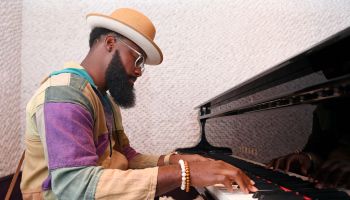
Photo: WTAE
Janese Talton-Jackson, a 29-year-old mother of three, was shot and killed after rejecting a man’s advances at a neighborhood bar in Pittsburgh. Women all over the world are all too familiar with the realities of street harassment and the fear of potentially being harmed for not “hollering” back. Dr. Obari Cartman examines how men can step up to end violence against women.
I remember being offended when a woman wrote down my license plate number on our first date. I drove up to her apartment, she came out, greeted me, then walked right to the front of my car, got the info off my plates and sent it to a friend. It was a mildly awkward moment, such obvious acknowledgement that I might attempt to destroy her. I made an inappropriate joke to relieve MY discomfort: “I wasn’t even thinking about kidnapping you until now hee hee”. She had a witty reply in cue because she’s used to easing men’s tension. Then we forced a laugh about something that wasn’t at all funny.
Obliviousness is the essence of privilege. Gretchen Kelly is right, men have the luxury of not thinking about so much. I’m reminded of it every time I’m with a woman while she’s apartment searching, planning routes on public transportation, getting dressed for a date, getting dressed for church, getting dressed for the grocery store. The fleeting thought of my body being violated sexually only occurred once in my life, while I was in jail over night for a traffic mishap, and even then I only considered it ironically. There’s likely no number for how many times Janese Talton-Jackson, in her 29 years, evaluated the vulnerability of her body in the vicinity of Black men. Each time before the last she probably figured: “nah I’ll be fine.”
MUST READ: These Are His Confessions: The Ways Black Men Avoid Feeling
The headlines reporting the tragedy of her murder are wrong. Janese did not die because she said “No.” She died because a man made the worst decision possible. It was all his fault. There is nothing she could have done differently. Her killer was a 41-year- old man at a bar – he’d been rejected before. We may never know what happened in that moment when he confused himself for God and punished Janese for being. Maybe he has undiagnosed disorders, or was on some chemical substance, or was possessed by an evil spirit. Whatever it was, Janese didn’t deserve to die. He will spend the rest of his life in the new mental health facility for brown people. And the fear that she might meet her demise at the whim of a disgruntled man has been reinforced in the hearts of women all over the country.
Janese Talton-Jackson’s story is worst case scenario, which makes it easy for other men to play the “good guy.” As convenient as it is to distance ourselves from a murderer, expressing shame when other men offend isn’t enough. The good guys, the men that know better, must be more vigilant, organized and urgent if we are to compete against the mass production of corrupt narratives about masculinity.
Most of us are familiar with maladaptive versions of masculinity we teach young men: i.e., emotions are for girls, men are designed to control, dominate, and conquer, etc. But the problem is deeper than that. The men in charge of the world have always sought status via violence and death. America is obsessed with death – evidenced by our past genocides, current military budget and the popular fascination with zombies, vampires, and apocalypses. The superficial power men work so hard to protect depends on the suppression of women because women are the representatives of life.
Black communities in particular would look a lot different if men worked to end violence against women with the same vigor we fight against racism, for capitalism, or for our favorite sports teams. Can you imagine a stadium full of men eating chicken wings and drinking beer with “END RAPE CULTURE” painted on their face? How about a mass demonstration of men marching to protest domestic violence like we do police brutality? Or pamphlets about reproductive justice and enthusiastic consent slipped into the sleeves of the bootleg movies sold at barbershops and gas stations? Or a boycott of any artist that utters a demeaning word about women? If any white rapper ever said a disrespectful anti-Black lyric, he’d be banned from Black radio forever. But R.Kelly.
Stopping violence against women is men’s work. No amount of women gathering for retreats, conferences or sister circles can replace the need for men to act. Even the most well intentioned “good guy” cannot escape the influence of the sexism and patriarchy that fuels this society. We must begin with all men doing the difficult, ongoing work of seeking out and extracting the male supremacy ideas and practices in our own lives. Healed people heal people.
Then we must teach younger men a better way to be men. We must reach out to them, develop relationships and support them. We must read with them. Print out and discuss the lyrics of their music. Travel with them, introduce them to culture, and beauty, and excellence. We must model discipline, character and integrity. We must help them discover their purpose so as they tap into their authentic power they won’t feel the need to mimic the presumed power that comes from dominating and controlling others. We must teach them what a true enemy is, and to reserve their fight for that. We must forfeit the cool points we cherish to challenge our brothers in private men spaces where we let so much misogyny slide in the name of camaraderie.
And we’ve got to do this work urgently. For our own well-being and for our children. Men sometimes say they don’t want to have daughters because of the karma from their actions with women. I challenge us instead to imagine and then work towards a world where all of our daughters can be safe, valued and never again need to be afraid of us.
Dr.Obari Cartman is a psychologist and the author of a new critically acclaimed book about manhood and relationships which can be purchased here: www.DrObariCartman.com
When Women Bleed For The Dysfunction Of Men: For Janese Talton-Jackson was originally published on blackdoctor.org
















